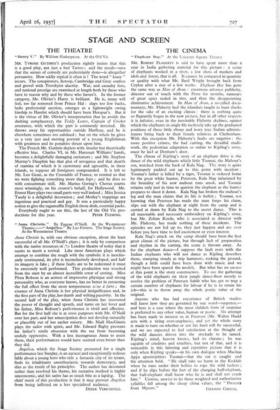THE CINEMA
" Elephant Boy." At the Leicester Square Theatre MR. ROBERT FLAHERTY is said to have spent more than a year in India gathering material for this picture : a scene of elephants washed in a river, a few shots of markets and idols and forest, that is all. It cannot be compared in quantity or quality with what Mr. Basil Wright brought back from Ceylon after a stay of a few weeks. Elephant Boy has gone the same way as Man of Aran : enormous advance publicity, director out of touch with the Press for months, rumours of great epics sealed in tins, and then the disappointing diminutive achievement. In Man of Aran, a so-called docu- mentary, Mr. Flaherty had the islanders taught to hunt sharks for the sake of an exciting climax : there is nothing quite so flagrantly bogus in the new picture, but in all other respects it is inferior, even in the inevitable Flaherty skylines, against which the elephants in single file tactlessly take up the graduated positions of those little ebony and ivory toys Indian adminis- trators bring back to their female relatives at Cheltenham. With this exception Mr. Flaherty's faults are negative : the more positive crimes, the bad cutting, the dreadful studio work, the pedestrian adaptation so unfair to Kipling's story, must be laid at Denham's door.
The climax of Kipling's story of an elephant drive is the dance of the wild elephants which little Toomai, the Mahout's son, watched from the back of Kala Nag. The story is quite legitimately padded out up to this point with incident : Toomai's father is killed by a tiger, Toomai is ordered home by the great white hunter, Petersen, Kala Nag infuriated by the brutality of his new mahout runs amok, and Toomai returns only just in time to quieten the elephant as the hunter prepares to shoot it down. Kala Nag has broken the mahout's leg and the man claims that its life is forfeit ; Toomai, not knowing that Petersen has made the man forgo his claim, slips out with the elephant at night from the camp and is carried at dawn by Kala Nag to the secret dance. This is all reasonable and necessary embroidery on Kipling's story, but Mr. Zoltan Korda, who is associated as director with Mr. Flaherty, has made nothing of these incidents. The episodes are not led up to, they just happen and are over before you have time to feel excitement or even interest.
Kala Nag's attack on the camp should have been the first great climax of the picture, but through lack of preparation and rhythm in the cutting, the scene is thrown away. As for the elephant dance—I suppose the fault rests with the Indian elephants who will not dance as Kipling describes them, stamping steady as trip hammers, rocking the ground, though a little could have been done with music and we might have been spared the models. But what has no excuse at this point is the story construction. To use the gathering of the wild elephants on their jungle dance-floor merely to resolve the problem of Petersen Sahib who has got to trap a certain number of elephants for labour if he is to retain his job—this is to throw away the whole poetic value of the original.
Anyone who has had experience of British studios will know how they are governed by one word—suspense,- and here is a case where the most childish form of suspense is preferred to any other value, human or poetic. No attempt has been made to interest us in Petersen (Mr. Walter Hudd acts with a tiring over-emphasis), and yet the whole story is made to turn on whether or not his hunt will be successful, and we are expected to feel satisfaction at the thought of the wild dancers driven into the stockade to be tamed. Kipling's mind, heaven knows, had its chasms ; he was capable of crudities and cruelties, but not of that, and it is noticeable in this faltering and repetitive picture that it is only when Kipling speaks—in his own dialogue when Machua Appa apostrophises Toomai—that the ear is caught and the attention held. " He shall take no harm in the Keddah when he runs under their bellies to rope the wild tuskers ; and if he slips before the feet of the charging bull-elephant, that bull-elephant shall know who he is and shall not crush him." Unwise, unwise to let those weighted and authoritative syllables fall among the cheap china values, the " Presents






















































 Previous page
Previous page